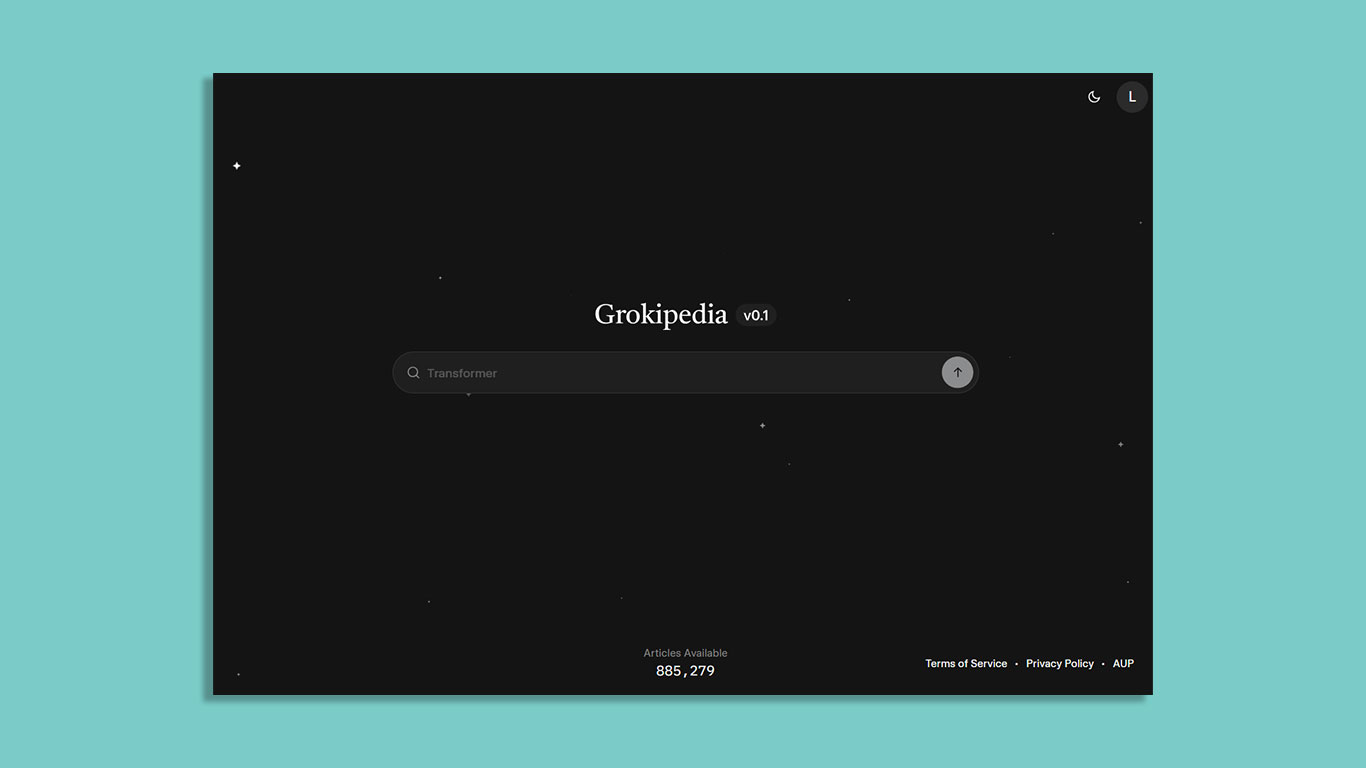On October 27, 2025, Elon Musk’s company xAI released the first version (version 0.1) of an alternative to Wikipedia, called Grokipedia.
It appears that the creation of Grokipedia was the result of an offhand comment made at an event Musk participated in this past September, the All In Summit. At that event, Musk was talking about how the next version of the AI chatbot, Grok, was being developed. He said that it wasn’t just going to be based on information that was scraped from the Internet. Instead, to quote:
“So, we’re running a lot of, using a lot of, inference compute and reasoning to look at all of the source data which is really the corpus of human knowledge and then uh thinking about each piece of information and then adding mod adding what’s missing um and correcting mistakes and removing falsehoods from the from that training data.”
In other words, rather than just grabbing information and training AI on it (garbage in, garbage out), xAI is apparently trying to evaluate the information that it obtains, and if needed/possible, to improve it first.
Musk then gave an example of what that would look like in the case of a Wikipedia page, at which point, one of the hosts, David Sacks, suggested to Musk that he should use this approach to create an alternative to Wikipedia, Grokipedia.
Now, less than two months later, we have Grokipedia version 0.1.
Grokipedia and the Hồng Bàng Dynasty
After Grokipedia was released, the first thing I did was to check its “history of Vietnam” page. Reading the overview at the top of the page, I found an error, but in general, I was pleased to see how neutral the wording was.
I then turned to the section on the “Legendary Hồng Bàng Dynasty,” as I have written on this topic.
After giving a summary of what is written in historical sources, this is what it says:
Scholarly analysis regards the Hồng Bàng accounts as a medieval construct rather than verifiable history, emerging post-independence from Chinese rule (after 939 AD) to fabricate a deep antiquity for Vietnamese statehood, akin to Chinese dynastic precedents but localized with dragon-fairy motifs.[27] The “Biography of the Hồng Bàng Clan,” a key textual source from 15th-century anthologies like Việt điện u linh tập, traces a genealogy from cosmic origins to the Hùng era, yet lacks corroboration from contemporary records or inscriptions.[28] Archaeological findings from the region, including Neolithic sites like Phùng Nguyên (ca. 2000–1500 BC) and Bronze Age Đông Sơn culture (ca. 1000–1 BC), indicate advanced societies with rice farming and metallurgy but no evidence of centralized kingship or the specific institutions attributed to the Hùng rulers.[26] Premodern Vietnamese historians accepted the legend provisionally while questioning chronological implausibilities, such as the dynasty’s improbable span aligning with biblical timelines critiqued in 19th-century analyses.[24]
I was pleased to see that first sentence, because that is my argument, and indeed, footnotes 27 and 28 are both linked to my article, on ResearchGate and JSTOR, respectively.
While I have uploaded the article to ResearchGate, the version on JSTOR link is behind a paywall, and perhaps not surprisingly, there is a mistake in the sentence that references that version as the “Biography of the Hồng Bàng Clan” is not in the Việt điện u linh tập, but instead, is in the Lĩnh Nam Chích Quái.
The final sentence is a bit weird and unnecessary, but it is linked to this blog, and I find that significant.
Finally, the second-to-last sentence, about archaeological findings not matching with what is written in historical accounts, is credited to an article by a Vietnamese scholar that was published in a journal based at a university in the Philippines, but that article doesn’t actually talk about archaeology (although the statement in Grokipedia is valid).
So, we have some issues here, but this is version 0.1, and it was produced in less than two months. This should be the worst version of Grokipedia that we will ever exist. I heard Elon Musk state in another interview that he expects that when Grokipedia reaches 1.0, it will be a hundred times better.
Now, I can guarantee you that when people in the Western academic world eventually comment on Grokipedia, most will make dumbass comments like these: “I’m never going to use something made by that f’ing billionaire!!” “It’s right-wing propaganda!!” “He just stole everything from Wikipedia!!” “Elon Musk is a fascist!!” Etc.
I, however, try my best in life not to be a dumbass (it’s hard, but I give it my best), so when I see the emergence of Grokipedia, the rationale behind it, and what the AI is attempting to do, I take it seriously, and try to learn more about it, and to think about the implications for myself, my profession, and for the world of knowledge.
The Problem with Wikipedia
While we don’t know what exactly happens when an AI chatbot responds to our prompts, when it comes to topics like history, it seems clear to me that Wikipedia serves as a kind of scaffolding for the information it obtains and sends back to us.
You can sense this when you see the “thinking” process where it will briefly say “searching Wikipedia” as well as now when it will link to Wikipedia in its answer.
This is not surprising given that Wikipedia always ranks at the top of Google searches, as through its references and the links to Wikipedia, it has become a high-ranked website. Hence, there is obviously a connection between the information structure of the Internet and the information structure of Large Language Models (LLMs).
The problem with Wikipedia, as Musk just said in the recent interview linked above, is that it is a “bad product.” It’s uneven (some pages are good, others are not). It’s created by people who are not always experts. And when it comes to topics that historians write about, it does not always reflect the current state of the field.
Finally, it’s a body of knowledge that is up to the whim of volunteers to decide whether or not they want to contribute to or update the content. And by now, I see pages that have gone years without any updates.
When Wikipedia first came out, scholars ridiculed it and dismissed it. Before long, I think everyone consulted it. I have always used it.
Now, like I said, it appears to be an important framework for what makes it into the responses to prompts in LLMs.
What I believe this meant prior to Grokipedia is that if a scholar’s scholarship/ideas were not on Wikipedia, then their ideas were less likely to make it into a response, unless someone specifically asked questions about that person’s work. This is at least what I have seen from working with LLMs to date.
So, prior to Grokipedia, what I imagined the situation going forward would be is that LLMs would continue to rely on Wikipedia, and that this would mean that between the work that scholars produced and the information that actual humans accessed through LLMs would be this “weak link” of Wikipedia with all of its limitations.
And for most scholars, that would mean that their life’s work would be irrelevant because it would never be linked or mentioned on Wikipedia, and if it was behind a paywall, then it would be even more unknown. . .
The Promise of Grokipedia
What I see Grokipedia attempting to do, is to address that weak link. So, it appears to be asking itself questions like, “What other reliable information on the Hồng Bàng Dynasty in Vietnamese history is out there?” And it then looks for what it can find.
Humility aside, my ideas about the Hùng Kings should be on a Wikipedia/Grokipedia page. The article I wrote made major claims. No one since has provided a strong evidence-based argument to overturn it, and various scholars have cited it in agreement.
If Wikipedia functioned following the norms of academia (that existed prior to the emergence of mass scholarly publishing in the 2010s, I’ll get to that below), you would have to acknowledge my position on the Hùng Kings, because a reviewer would demand that you do so, given that it is the “state of the field” on that topic.
However, Wikipedia doesn’t follow those norms because the people who contribute to it are not compelled to adhere to professionally-agreed positions. It’s more a case of reaching an agreement between whoever volunteers to contribute to a Wikipedia page.
Sometimes that works, and that is why there are good Wikipedia pages, but at other times it doesn’t.
Again, this is what Grokipedia is attempting to address.
The Key Question
Grokipedia (and the version of Grok that is in training) is an extremely significant development. As I see it, it is a major attempt to move beyond the “garbage in, garbage out” model of LLMs up to this point.
So, for those of you out there who are not suffering from Elon Musk Derangement Syndrome, please take a look at Grokipedia and start thinking about it, because I’m sure other companies will follow this model (minus creating their own version of Wikipedia) or some variation of it.
Sam Altman of OpenAI just stated this past week that ChatGPT will be able to serve as a research assistant in 2026 and conduct research on its own by 2028. I have no idea what OpenAI is actually doing, but here again, what we see is an effort to train LLMs to evaluate information.
The key question for me is: What information is Grokipedia going to consider valid?
Starting in this century, but really taking off in the 2010s, there has been an explosion of new journals. As is well known, there have been countless predatory and scam journals, but there are also many “grey zone” journals.
The journal from the Philippines that I mentioned above is an example of that. It’s a legitimate journal based at a reputable university however you can see from the information about the journal that it does not have the expertise to handle a paper on a topic like the Hùng Kings.
Its editors include a sociologist who researches about health issues, a professor of political science and development studies, a professor in the field of public health, and a scholar with a PhD in English literature who works in the area of postcolonial studies and cultural/critical theory.
These scholars are undoubtedly capable of knowing who to send for review papers in certain topics in health and development and postcolonial studies, and would be able to evaluate the responses of the reviewers, but the Hùng Kings is clearly far from their areas of expertise.
Meanwhile, their journal is ranked Q1 in Scopus, higher than the Journal of Vietnamese Studies (Q2), where editors would definitely know how to handle any paper in Vietnamese history.
Further, many “grey zone” and predatory/scam journals are open source, while “traditional” journals like the Journal of Vietnamese Studies are behind a paywall.
So, how will Grokipedia treat this massive body of knowledge that has emerged globally in the past two or more decades in the countless “grey zone” and predatory/scam journals of the world? What information or metrics, for instance, will it use to differentiate between journals?
This will be interesting to see.
Finally, of course, as more academic publishers make deals with AI companies, then works that are now behind paywalls will get added to the mix.
What will Grokipedia look like then?




As a self-proclaimed EMDS non-patient, I think I would take Grokipedia seriously at the same time as I probably acknowledge what its creators’ ulterior motives are. So, in a way, I would use it with the similar mindset as I use Wikipedia: as a decent jumping point for some topics, and as a snapshot of some groups’ concensus for some other. E.g. you have convinced me that I could use Grokipedia for history topics as I haved used Wikipedia for hard science topics.
Thank you for the comments, and I’m glad to hear that your brain is functioning properly!!
When Google came out with NotebookLM, I put one of my articles in it and asked it to make a podcast.
While it made a few errors (particularly when at one point, it brought in information from outside the article), in general, I found it to be much more neutral, and much more capable of understanding what I actually wrote, than many human readers.
I have had many conversations over the years with people who do not like what I wrote, and in those conversations, I can see that these people didn’t actually understand what I had written.
When you have ideas that are different/counter to what the group thinks, there are members of the group who instinctually want to refute what you say. That instinct, I would argue, is more powerful than logic, and it ends up blinding those people as they become incapable of calmly reading a document and understanding what it says and seeing the evidence that it is based on.
Again, I’ve had so many conversations where I’ve had to point out “But I didn’t say that. That’s what you assume I must think. Look at what I actually wrote!”
It could be the case that AI has the potential to improve upon this issue. It doesn’t have a dog in the fight, so it doesn’t have to take a side, and it’s not going to get upset if someone comes along and presents an evidence-based argument that counters what it has previously written.
Professor, can you talk about the billionaires oligarchs take over of America and their ongoing Nazification of the US?
Sure. The US has always been controlled by the rich. The only difference now is the number of zeros, but that is a result of economic scale in our globalized economy. Lobbying is an institutionalized form of control by the rich, and Big Pharma’s ownership of the media is one of their many tools for influencing the public to focus on dumbass and meaningless concepts like “Nazification,” rather than to pay attention to the deep institutionalized corruption that has long been at the core of the government.
And by the way, why aren’t you brave enough to reveal your actual name when you make snarky comments like this? What are you afraid of? Leaving comments as “anon” is the online equivalent of protesting with a mask on.
I’m old enough to remember how professors (I was one of them) regarded student use of Wikipedia — an unreliable, “unscholarly” tool that facilitated plagiarism. I’m also old enough to remember hand-copying text from the World Book Encyclopedia for essays in elementary school. The former: crowd-sourced information curated by “amateurs,” who in some cases were knowledgeable about topics even though they lacked the expected credentials. The latter: information curated by “experts” that other experts thought was basic but reliable/in agreement with the generally accepted view.
To return to one of your frequent themes, if the work of curation at an expert level can be automated, where does that leave the actual experts and the venues that have traditionally disseminated their output (which have always been difficult or impossible for the public to access)?
OH, I did that in elementary school too. . . 🙂
“where does that leave the actual experts and the venues that have traditionally disseminated their output (which have always been difficult or impossible for the public to access)”
While it’s still very, very early, I think Grokipedia points in a more positive direction than anything I have seen previously.
What I saw previously: you have the traditional academic world producing knowledge in the more or less the same way since the analog age – some of that info makes it onto Wikipedia – when normal people look for information, they turn to AI, and in retrieving information, Wikipedia plays an influential role in determining what will be returned to the person.
What I see now: you have the traditional academic world producing knowledge in the more or less the same way since the analog age – some of that info makes it onto Grokipedia which has been created by analyzing additional information, such as scholarly information on ResearchGate and Academia.edu – when normal people look for information, they turn to AI, and if they use Grok, potentially more thorough information will be returned to the person, information which potentially could better reflect what the scholarly work on the topic has demonstrated.
In other words, right now there appears to be a “middleman” (Wikipedia) between scholarly output and what LLMs provide to answer questions. xAI is trying to create a better middleman, one that will more accurately represent the state of scholarly knowledge.
I think that’s good news for people who produce scholarly knowledge (“good news” in a world where everything goes to AI and no one beyond small scholarly communities actually reads the books/articles that scholars produce). Again, there are a lot of questions I have about how scholarly publications will be evaluated/understood, but it’s good that they are being included/examined.
I have a question on the usage of Chu Han in Vietnam. Can I ask do you have any works or can recommend any works on the decline of Chu Han usage in Vietnam? Like when did the Vietnamese government stopped using Chu Han?
Thanks for the comment.
I’m not aware of any works that document the decline of chu Han (If anyone does, please feel free to let us know). People have written about the rise of Quoc Ngu, but they don’t specifically write about chu Han usage.
Nguyen dynasty officials continued to use chu Han throughout the colonial period, and I’ve seen land contracts from the 1950s that were still in chu Han.
While not specifically about that topic, I recently published an article on “Sinology in Vietnam” which indirectly covers this topic. If you are interested, you can access it here:
https://www.academia.edu/104064351/Sinology_in_Vietnam
So then was there by the end of Nguyen rule a usage of both Quoc Ngu and Chu Han by the government?